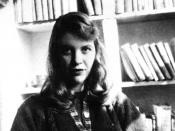A bell jar can literally be defined simply as "a bell-shaped usually glass vessel designed to cover objects or to contain a vacuum." In The Bell Jar by Sylvia Plath, the term "bell jar" is used as a metaphor to relate the main character's insanity to that of an enclosed jar or vacuum. Esther Greenwood, a highly intelligent and talented young girl who is torn between the struggles of society's expectations and the contradictory personalities of her peers, believes the bell jar is always there above her, and sometimes it will descend, suffocating her.
One main contribution to Esther's downfall was the lack of support and understanding of her intellectual and artistic ambitions. In the beginning of the novel, she states, "I was supposed to be having the time of my life. I was supposed to be the envy of thousands of other college girls just like me."
Everyone saw Esther for the prize won here or the scholarship awarded there, few recognized her ambitions. Even her mother failed to support Esther's desires and aspirations. After her husband's death, Esther's mother was forced to support her family, and wanted Esther to choose a practical career like being a secretary. She takes Esther's mental instabilities personally, constantly wondering what she did wrong as a mother. Buddy Willard, Esther's boyfriend for most of the story, also doesn't realize Esther's needs. He really did love Esther, as proven when he attempted to find a common interest between them by writing and reading poetry. Despite his efforts, Esther could never see herself settling down with Buddy, mainly due to the hypocrisy Buddy revealed when he told Esther of the love affair he had with a coworker.
The more people Esther meets and dates, the more society ad it's standards are revealed corrupt. Doreen, Esther's friend who won the same magazine contest, is very snobby and often judges others based on appearances, but still cares for Esther. Doreen tries to include Esther when she goes out, an also sets her up with dates to accompany her and her boyfriend. Two of the men she arranges to go out with Esther are Frankie and Marco. Esther doesn't like Frankie at all, and Marco tries to rape her. She also goes out with Constantin, a translator Esther met through Mrs. Willard; and Irwin, a young professor.
When Esther's madness becomes apparent, she is sent to different private hospitals. the first psychiatrist Esther sees is Dr. Gordon. In his office, the patients seemed lifeless, and the living room oddly seemed normal, with no bars on the windows and no strange or loud noises. Esther compares the room to a department store, "The figures around me weren't people, but shop dummies, painted to resemble people and propped up in attitudes counterfeiting life." Dr. Gordon was nothing like Esther's expectations, and she hated him from the moment she met him. She thought he was conceited and had no concern for her well-being. Dr. Gordon made Esther undergo painful shock treatments, which she feels are some sort of punishment, and wonders what her mistake was. Philomena Guinea, the same woman who gave Esther her scholarship, also helps her to be treated successfully at a different private hospital. Esther admires Mrs. Guinea, who is an independent and intelligent woman that recognizes not only Esther's talents but her ambitions as well. At her new hospital, Esther is surprised to learn her new psychiatrist, Dr. Nolan, not only is a woman, but is also smart, funny, and respectful. Esther undergoes shock treatments again, but as Dr. Nolan promised, they weren't scary or painful, as they were with Dr, Gordon. In this hospital, Esther actually improves.
Throughout the novel, Esther slowly becomes mentally ill; attempts suicide in multiple different ways, never finding the perfect way to die; and slowly gets better. The story began in the summer of Esther's downfall, and a good part of the story is told as flashbacks or memories. this story is in many ways parallel to the life of Sylvia Plath, and can be viewed as a lightly disguised autobiography. Although it is not imperative to the reader's full understanding of the novel, a general knowledge of th life of Sylvia Plath and her ultimate suicide does add to the "power" of the novel.





